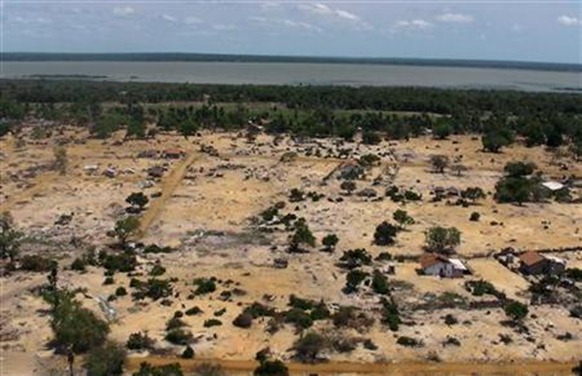 A U.N.-appointed panel has found "credible allegations" that tens of thousands of civilians were killed and war crimes were committed in the final months of Sri Lanka’s war with the Liberation Tigers of Tamil Eelam, and urged the investigation and prosecution of those responsible.
A U.N.-appointed panel has found "credible allegations" that tens of thousands of civilians were killed and war crimes were committed in the final months of Sri Lanka’s war with the Liberation Tigers of Tamil Eelam, and urged the investigation and prosecution of those responsible.
"The panel found credible allegations, which if proven, indicate that a wide range of serious violations of international humanitarian law and international human rights law were committed both by the Government of Sri Lanka and the LTTE, some of which would amount to war crimes," an excerpt of the report, leaked to Sri Lankan newspapers, says.
The report by the panel appointed by U.N. Secretary-General Ban Ki-moon represents the biggest pressure brought to bear on the government over the quarter-century war’s end.
Sri Lanka’s government has consistently denied allegations that it targeted civilians. It has acknowledged that some were killed as troops advanced on an ever-shrinking patch of land on the northeastern coast of the Indian Ocean island.
"The report is a fraud and biased and we reject it," government spokesman and Media Minister Keheliya Rambukwella said. "We are not panicked, and even we made our protest when they appointed the panel with regard to their mandate. Our stand has not changed."
President Mahinda Rajapaksa’s government refused to let the panel into Sri Lanka as it prepared its report, under a mandate to advise Ban on accountability for any violations of international law committed at the end of the war.
Though the panel blames both sides for deaths, the elimination of the LTTE’s leadership by the government in May 2009 means that only government forces would be held accountable, should any inquiry arise.
The report specifically accuses the government of widespread shelling including targeting field hospitals, denial of humanitarian aid, and rights violations against people inside and outside the conflict zone.
"Most civilian casualties in the final phases of the war were caused by government shelling," the report says. "It shelled in spite of its knowledge of the impact."
LTTE ALSO BLAMED
The panel accuses the LTTE of using civilians as human shields, killing fleeing civilians, forcible child recruitment, forced labor and killing civilians via suicide attacks.
The panel urged "a serious investigation and the prosecution of those responsible."
"If proven, those most responsible, including Sri Lanka Army commanders and senior government officials, as well as military and civilian LTTE leaders, would bear criminal liability for international crimes," the report says.
Most of the allegations included in the report have been made in the past by rights organizations and Tamil diaspora groups that supported the LTTE and have pushed, since the LTTE’s defeat, for a war crimes inquiry.
Over the weekend, Rajapaksa urged supporters to gather in force for a May Day protest.
"The time has come to show our strength ….to demonstrate against the injustice done to the country before the world," Rajapaksa told party officials at a meeting. "I am prepared to face any punishment on behalf of the motherland."
In July, a hardline cabinet minister led a three-day siege of the U.N. offices in Colombo to protest the U.N. panel, drawing Western condemnation.
Rajapaksa’s government defeated the LTTE, which was on more than 30 nations’ terrorism lists, after a stop-start separatist war that began in earnest in 1983.
(For updates you can share with your friends, follow TNN on Facebook and Twitter )
